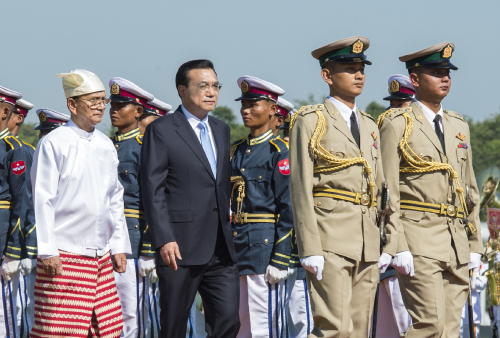|
 |
|
WELCOME TO MYANMAR: Myanmar President U Thein Sein hosts a welcoming ceremony for visiting Chinese Premier Li Keqiang in Nay Pyi Taw on November 14 (WANG YE) |
Wei stressed that China is sincere and capable of helping ASEAN nations to build infrastructure and improve connectivity, which will undoubtedly pave the way for a "Diamond Decade" of China-ASEAN relations.
China's efforts to promote China-ASEAN connectivity and common prosperity have also gained appreciation among observers from ASEAN nations. Chheang Vannarith, a senior researcher at the Cambodian Institute for Cooperation and Peace, said that China has proven its leadership role in fostering peace and promoting regional cooperation.
Joseph Matthews, Director of the International Cooperation Department at the Asia Euro University in Phnom Penh, Cambodia, told Xinhua News Agency, "China is willing and offering to share its prosperity and economic growth with its all neighbors irrespective of their internal policy toward China or internal political situations."
Maritime disputes
In his speech at the Ninth East Asia Summit, Premier Li reiterated China's commitment to a peaceful resolution to its disputes with some ASEAN countries over the South China Sea.
Premier Li affirmed the "dual-track approach" for dealing with the South China Sea issue, which states that relevant specific disputes should be solved through negotiations and consultations by countries directly concerned, and that peace and stability in the region should be jointly upheld by China and ASEAN countries working together. The premier also stressed that the situation in the South China Sea is on the whole stable and the freedom and safety of navigation in the region is ensured.
China and ASEAN have agreed to actively carry out consultation to reach—on the basis of consensus—a code of conduct in the South China Sea at an early date, which has made initial achievements.
Wei said that Li's remarks showed that the Chinese Government does not hide from these differences, but works to contribute concrete measures to solve disputes. "It demonstrates China's sincerity and determination for the long-term and good-neighborly friendship with ASEAN," she said.
Tang Qifang, an expert on Southeast Asian studies with the CIIS, said that she believes the negotiations on the COC will soon make concrete progress.
"The previous negotiations will probably be advanced and institutionalized later," Tang said. "All parties will try to tease out the consensus and minimize differences."
In a chairman's statement issued after the 17th ASEAN-China Summit on November 13, Southeast Asian countries agreed to increase mutual trust with China to enhance maritime security and resolve disputes by peaceful means. ASEAN reaffirmed its commitment to the full and effective implementation of the Declaration on the Conduct of Parties in the South China Sea in its entirety as well as to work toward the early conclusion of a code of conduct in the South China Sea.
The statement also voiced support for the implementation of early harvest measures, including the adoption of the first list of commonalities on consultations for a code of conduct in the South China Sea, the establishment of a hotline platform among search and rescue agencies, a hotline among foreign ministries on maritime emergencies, and a table-top exercise on search and rescue.
ASEAN agreed to designate the year 2015 as the ASEAN-China Year of Maritime Cooperation, welcoming China's comprehensive plan for utilizing the ASEAN-China Maritime Cooperation Fund to provide financial support for their cooperation in the areas of maritime connectivity, marine science and technology, as well as maritime scientific research, search and rescue, disaster management and navigation safety.
Wei added that shared interests between China and ASEAN nations far outweigh their differences over the South China Sea issue. She proposed all sides should view and settle the issue with a focus on making progress.
"With the gradual increase of mutual trust, disputes can be well managed and settled," Wei added.
| 